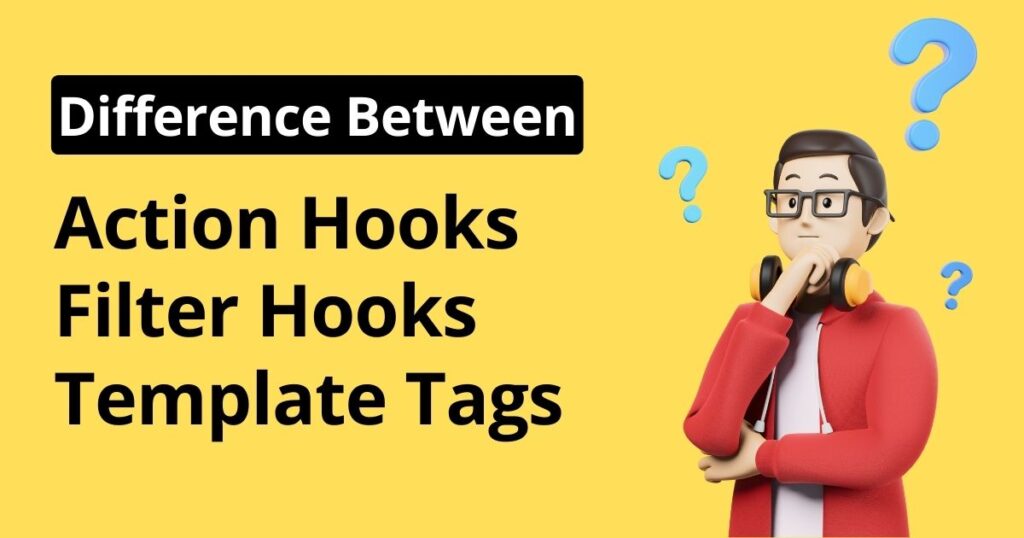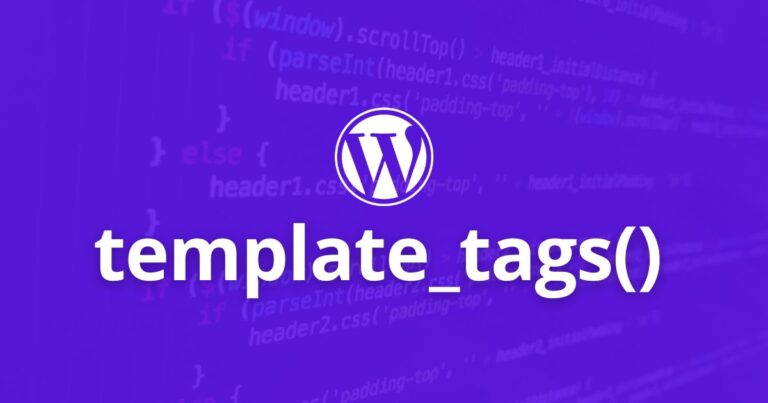Action Hooks, Filter Hooks & Template Tags.
WordPress is a powerful and flexible content management system that provides developers with a variety of tools to customize and extend the platform. Three of the most common tools used to modify WordPress functionality are action hooks, filter hooks, and template tags. In this article, we will explore the differences between these three types of hooks and provide examples of how they can be used in WordPress development.

1: Action Hooks
Action hooks in WordPress allow developers to execute custom code at specific points in the WordPress execution process. These hooks are triggered by specific events or actions, such as when a post is published, a plugin is activated, or a user logs in. When an action hook is triggered, any custom code that has been attached to that hook will be executed.
Action hooks are often used to modify or extend WordPress functionality. For example, a plugin might use the init action hook to register custom post types or taxonomies, or the wp_enqueue_scripts hook to add custom CSS or JavaScript to the front-end of a WordPress site.
To add custom code to an action hook, you can use the add_action() function. The add_action() function takes two arguments: the name of the action hook and the name of the function to be executed when the hook is triggered. Here’s an example:
function my_custom_function() {
// Custom code goes here
}
add_action( 'init', 'my_custom_function' );
In this example, the my_custom_function() function will be executed when the init action hook is triggered.
2: Filter Hooks
Filter hooks in WordPress allow developers to modify or filter data as it passes through WordPress. When data is passed through a filter hook, any custom code that has been attached to that hook can modify the data before it is processed further by WordPress.
Filter hooks are often used to modify the output of WordPress functions or to filter data entered by users. For example, a plugin might use the the_content filter hook to modify the content of a post before it is displayed, or the sanitize_text_field filter hook to sanitize user input before it is saved to the WordPress database.
To add custom code to a filter hook, you can use the add_filter() function. The add_filter() function takes two arguments: the name of the filter hook and the name of the function to be executed when the hook is triggered. Here’s an example:
function my_custom_filter_function( $data ) {
// Custom code to modify $data goes here
return $data;
}
add_filter( 'the_content', 'my_custom_filter_function' );
In this example, the my_custom_filter_function() function will be executed when the the_content filter hook is triggered. The $data parameter represents the data that is being filtered, and the function should return the modified data.
3: Template Tags
Template tags in WordPress are functions that can be used to display or retrieve specific information in a WordPress template. These functions are designed to make it easy for developers to display common elements, such as post titles, content, or metadata, without having to write custom code.
Template tags are often used in WordPress themes to display content on the front-end of a site. For example, the the_title() template tag can be used to display the title of a post, and the the_content() template tag can be used to display the content of a post.
<h1><?php the_title(); ?></h1>
<div class="entry-content">
<?php the_content(); ?>
</div>
In this example, the the_title() template tag is used to display the title of a post inside an h1 heading tag, and the the_content() template tag is used to display the content of a post inside a div with a class of entry-content.
Conclusion
In summary, action hooks, filter hooks, and template tags are three powerful tools that WordPress developers can use to modify and extend the WordPress platform. Action hooks allow developers to execute custom code at specific points in the WordPress execution process, filter hooks allow developers to modify or filter data as it passes through WordPress, and template tags allow developers to display or retrieve specific information in a WordPress template.
By understanding the differences between these three types of hooks, WordPress developers can create more powerful and flexible customizations that can help to make their WordPress sites more functional and engaging for their users.
If you are just starting with WordPress theme development, then this WordPress Developer Roadmap can help you with getting started in the WordPress developer ecosystem.







One Response